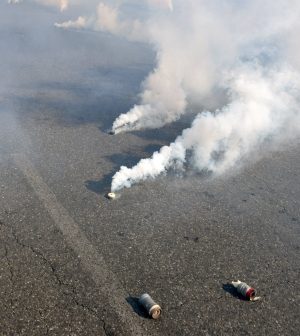- Could Your Grocery Store Meat Be Causing Recurring UTIs?
- Are You Making This Expensive Thermostat Error This Winter?
- Recognizing the Signs of Hypothyroidism
- 10 Strategies to Overcome Insomnia
- Could Artificial Sweeteners Be Aging the Brain Faster?
- Techniques for Soothing Your Nervous System
- Does the Water in Your House Smell Funny? Here’s Why
- Can a Daily Dose of Apple Cider Vinegar Actually Aid Weight Loss?
- 6 Health Beverages That Can Actually Spike Your Blood Sugar
- Treatment Options for Social Anxiety Disorder
Tear Gas Might Harm a Woman’s Reproductive Health

Researchers in Minnesota have uncovered a new link between tear gas exposures and negative effects on reproductive health.
The study was prompted by anecdotal reports of irregular menstrual cycles among protestors who were exposed to tear gas during the nationwide protests that followed the May 2020 murder of George Floyd.
“This study adds to previous research documenting the many ways that structural racism through police violence can impact reproductive and perinatal health,” said lead author Asha Hassan, a researcher at the University of Minnesota’s Center for Antiracism Research for Health Equity, in Minneapolis.
“Law enforcement agencies see chemical agents as ‘less lethal’ weapons, but the fact is that we do not know very much about the short-term or long-term public health effects tear gas and other chemical agents have on reproductive health. This study is only the beginning of raising questions about the health effects of tear gas exposure,” Hassan added in a university news release.
Using a national survey, the researchers collected and analyzed data about reproductive and sexual health experiences of female protesters who were exposed to chemical agents.
In all, 83% of respondents reported at least one adverse reproductive health outcome, including uterine cramping, early menstrual bleeding, breast tenderness and delayed menstrual bleeding.
The risk of an adverse reproductive health outcome rose with increased exposure. Women with five days or more of exposure had 2.6 times more negative reproductive outcomes, the investigators found.
The study adds to past research about the short- and long-term health effects of exposure to chemical agents collectively called “tear gas.”
Many of these chemicals have been banned in active warfare by international treaties because of their links to health problems, including blindness, glaucoma and respiratory failure, the study authors pointed out.
The researchers urgently recommended that policymakers push for limits, conditions and greater transparency in law enforcement agencies’ use of chemical agents.
The study findings were recently published in the journal Frontiers in Epidemiology.
Researchers from Planned Parenthood North Central States co-authored the study.
More information
The U.S. Centers for Disease Control and Prevention has more on tear gas.
SOURCE: University of Minnesota, news release, Sept. 21, 2023
Source: HealthDay
Copyright © 2026 HealthDay. All rights reserved.










